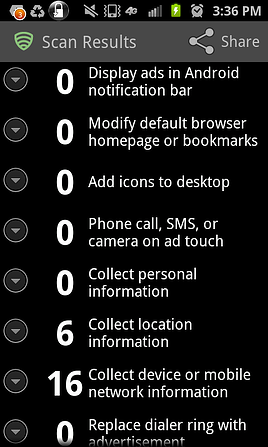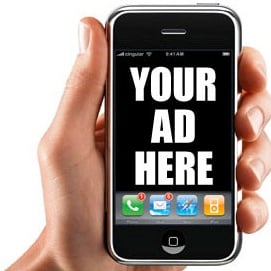If you’re like me and own an Android, you know you’ve done it – there’s that one really cool live wallpaper in the Play Store you just have to check out to see how slick your home screen can look. Next thing you know, you’ve installed another and then another and within 15 minutes you’ve amassed a cornucopia of dazzling, animated images that really make you feel like that high tech device in your hand is something from the future. Just as you finally settle on one you really like, it suddenly happens – some random icon you’ve never seen before pops up in the notification bar. You slide your thumb down to open the tray and there it is staring you right in the face: an intrusive push notification advertisement.
NOTE: None of the apps I linked to above have done anything of the sort to my phone. Honestly, I just think they’re pretty cool.
This week Lookout Mobile Security just released their Mobile App Advertising Guidelines which is focused on educating both App Publishers and Ad Providers on how best to serve up targeted mobile advertising without overstepping the bounds into the realm of aggressive behavior. Aggressive mobile app behavior (which is far more prevalent on Android than iOS) includes such things as push notification ads, additions to your bookmarks, adding application icons to your home screen, and even replacing your ringtone with an ad. Often times applications serving up these sorts of advertisements don’t provide users with a way to opt-out, obscure the permissions they require of the device (why does that horoscope application need to know your location or read your contact list?), or bury the information in a never-ending ToS screen. According to Lookout, applications focused on personalization, gaming, and entertainment lead the pack in implementing aggressive ad strategies.
 [I'm fine with some data being collected, but changing my ringtone?]
[I'm fine with some data being collected, but changing my ringtone?]
Taking their cue from the Consumer Data Privacy Framework, the Mobile User Privacy Bill of Rights, and the CDT/FPF App Privacy Guidelines, Lookout outlined a number of top-tier privacy categories that should be considered by publishers and providers serving up mobile advertising. Main topics include:
Transparency and Clarity: Obtain informed consent regarding data collection, the use of non-standard monetization methods, and system changes made by applications.
Enabling of Individual Control: The ability to opt-in/opt-out of targeting, data collection, and requested OS permissions by device owners.
Context and Control over Experimental Ad Delivery Behavior: Such as informing the user of exactly what apps are utilizing push notifications for ads or modifying browser settings so they may remove them.
Focused Data Collection: Reasonable limits on collecting data from devices that can uniquely identify users.
Transport Security: The use of hashing and encryption to make sure data collected by App Developers and Ad Providers is always secure from breach.
Lookout’s guidelines include a series of required implementations and optional best-practices developers and providers must and should take to find themselves in compliance with fair advertising delivery. If an application isn’t in compliance with the base level requisites it can easily find itself labeled as privacy infringing or adware. According to CNET, Lookout CTO Kevin Mahaffey noted that the company is looking into ways of notifying users of aggressive ad behavior applications at the time of installation. While they haven’t worked out the details yet, this will most likely be done through their own Security & Antivirus application.
I understand that most advertisers won’t be using this method to deliver their ads to potential customers. For the most part the push notification method is used to advertise other apps or reroute a user to a search service or website – I highly doubt any local or national advertisers are taking this approach. Nonetheless, aggressive mobile advertising points to new delivery methods we haven’t really seen before. While we all know the ubiquity of smartphones have opened up a world of possibilities for advertisement delivery, it’s worth taking a step back for a minute to ask ourselves an important question: Just because we can, does it mean we should? It’s a no brainer that getting your advertisement in front of more eyes is advantageous, but when potential customers are talking about your delivery method like this, do you really think you’re going to help a client in the long run?




